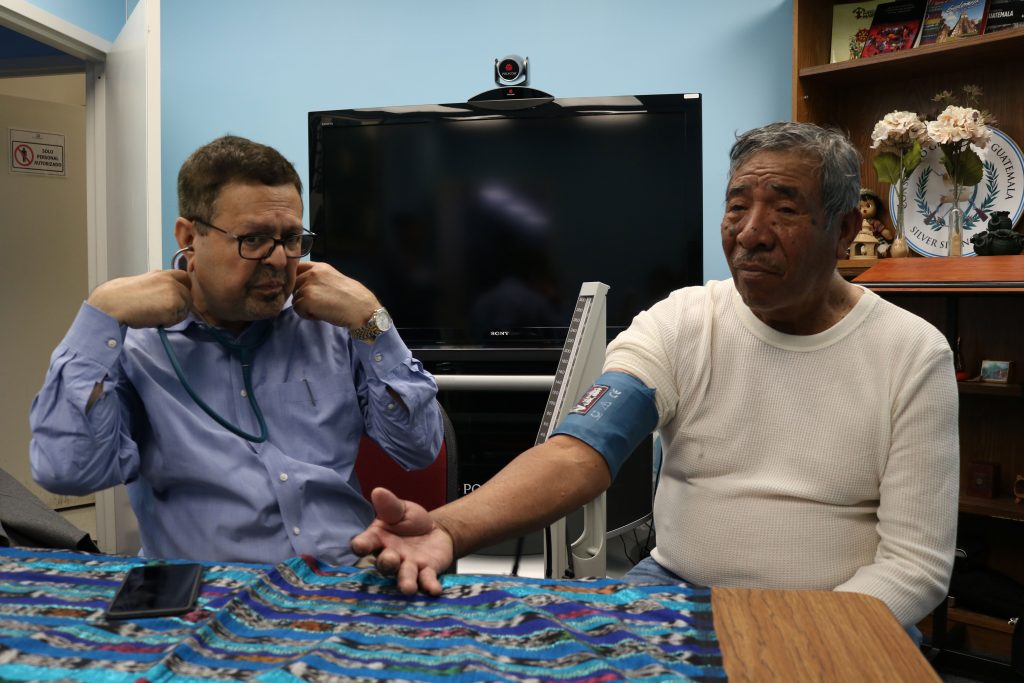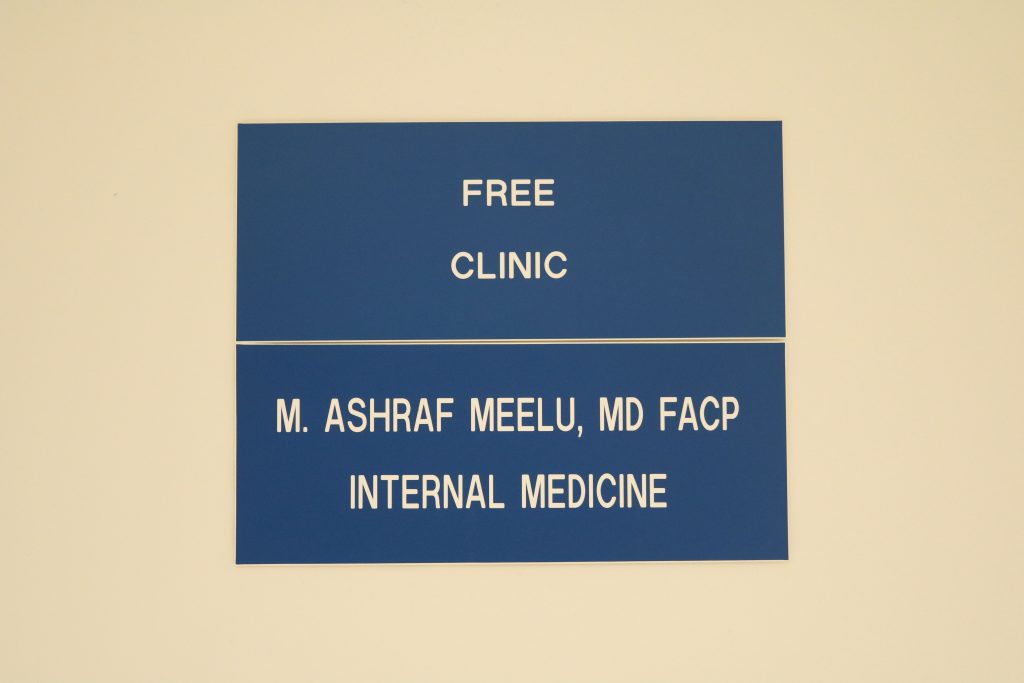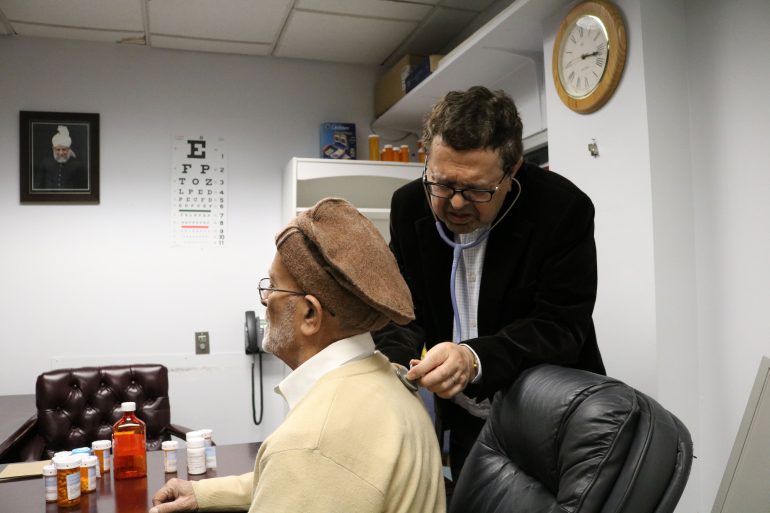SILVER SPRING, Maryland – For the past 10 years, Dr. Ashraf Meelu has paid out-of-pocket to offer basic health care in clinics open to the public.
The 64-year-old Muslim doctor from Lothian, Maryland, is a certified physician in oncology and hematology. He, along with a few volunteers, spends Friday mornings providing flu shots, measuring blood pressure and offering other health treatments at a Guatemalan consulate in Silver Spring, Maryland.
Here, patients file in, one after another, for the Pakistan native’s treatments.
Spread by word-of-mouth, the clinic sees patients from across Maryland and nearby states.
Salvadoran Alfredo Moran, a resident of Manassas, Virginia, drove an hour and a half to the free clinic on a recent Friday. The 80-year-old car washer was suffering from a fever and high blood pressure.
Moran, a U.S. citizen, told the University of Maryland’s Capital News Service through a translator that he has a primary care physician and is insured by Medicare, but rising prices and limited coverage deter him. Meelu provided him with medication for his fever, a prescription to get his blood pressure under control and told him to return in two weeks.

Luis Morales is a 47-year-old Glen Burnie, Maryland, resident, originally from Guatemala. He said the free clinic is very helpful. Morales is not a United States citizen and is uninsured, thus finding health care poses an issue.
“I didn’t want to miss the opportunity,” Morales said about the clinic through a translator. After a friend informed him about the clinic, Morales decided to make the 50-minute drive to inquire about his regular headaches. Meelu diagnosed the root cause to be high blood pressure and sent him home with medication to treat it.
Meelu said he hopes his service sheds a positive light on Islam, especially in recent times of terror.
“I really feel ashamed when I see the stories on the TV of what ISIS is doing,” Meelu said. “These people are really giving a bad name to Islam. That is not our teaching. That is not our goal. I hope what we do assures people.”
And, Meelu said, the rhetoric of President-elect Donald Trump on Muslim immigrants is worrisome to the Ahmadiyya community.
“We are scared,” Meelu said. “But the Ahmadiyya Muslim community (consists of) peace-loving people. We have nothing to do with terrorism … but we are lumped together as Muslims.”
Meelu said he disagrees with Trump’s view on banning Muslims from entering the United States.
“We should be a little bit vigilant but we should not completely stop people coming to this country.”
Moran said he felt good about being treated by a doctor who is a fellow immigrant, and appreciates that there is no charge for his health care.
Meelu explained that his free clinics are just part of his responsibility as an Ahmadiyya Muslim. He said duty to God and giving alms are two fundamental obligations of his faith.
“Knowing that a lot of patients are immigrants … (many) have no jobs, no money, no income,” Meelu said. So he offers treatments at no cost. “I feel I am doing something for humanity even though it is on a very small scale.”
With the help of translator Susana Valdivia, Meelu and his volunteers provide free healthcare to those in a large waiting room at the consulate, where every seat is taken on Friday mornings.
“They proceed with checking the basics — checking high blood pressure, sugar for diabetes and some recommendations about prescriptions,” Valdivia said. “But everything is free. We are very happy to have them here because it helps a lot of the community. We are very grateful.”
By mid-afternoon on these Fridays, Meelu leaves the consulate and visits his mosque, the Ahmadiyya Muslim national headquarters, for prayer service. Following prayers, Meelu heads to the basement of the Silver Spring mosque to offer free primary care to many of his fellow Muslims, although the clinic is open to the public.
“We do not discriminate against anybody,” Meelu said. “Anybody can come. And everybody is treated the same, equally, and with compassion. We give them advice.”
At the Mosque clinic, Meelu invites patients into a single room divided into two separate areas by a curtain. Patients sit with Meelu at his desk, one at a time, for consultations on one side, while Meelu’s Ahmadiyya Muslim volunteers provide flu shots on the other side of the curtain.
Many of the patients at the mosque come for the same basic care treatments that those at the Guatemalan clinic receive. Meelu takes blood pressure levels and diagnoses those with cold, flu and congestion symptoms.

Mohammad Bashir, an uninsured 65-year-old Pakistani immigrant from Millersville, Maryland, said Meelu saved his foot from amputation. He visits the clinic regularly now for check-ups.
Bashir suffers from neuropathy, or numbness, in his feet — a side effect of his diabetes. Bashir applied heat to his feet before falling asleep one night and woke up with severe burns.
“(Meelu) gave me high-potency antibiotics,” Bashir said. “He was worried because the foot had turned black. He is giving me the assistance and medicine free of cost.”
There are times, however, when patients need treatment beyond what Meelu can offer.
“It will break your heart when somebody has a problem that is beyond your capacity and capability,” Meelu said. “I know they don’t have anywhere to go because they don’t have insurance.”
While this poses an issue, Meelu uses his connections to get his patients the best free help possible. Meelu said he works with LabCorp to get free blood work tests for his patients who need them.
And if a patient has symptoms that are unfamiliar to Meelu, he knows other doctors to contact for their expert opinion. Meelu said he even goes to primary care offices for samples to bring to his own clinic.
“I don’t feel bad about … asking for help,” Meelu said. “Most of the time physicians are very good and generous to me and they help me out.”
Meelu’s philanthropy has not gone unnoticed.
In October, he and his fellow volunteers from the Ahmadiyya Muslim community received the Governor’s Service Award for outstanding faith-based humanitarian work. According to the state, the award commends those “working to change Maryland for the better.”
The Governor’s Office on Service tallied Meelu and his aides volunteered a combined 900 hours to help around 500 patients in 2015.
“We are all the same as a part of humanity,” Meelu said. “These activities give us a strength to help and serve fellow human beings.”


You must be logged in to post a comment.